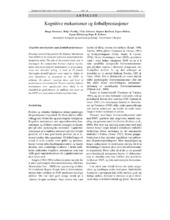| dc.contributor.author | Sivertsen, Børge | |
| dc.contributor.author | Nordby, Helge | |
| dc.contributor.author | Johnsen, Vilde | |
| dc.contributor.author | Rydland, Ingunn | |
| dc.contributor.author | Odden, Espen | |
| dc.contributor.author | Håland, Espen | |
| dc.contributor.author | Eriksen, Hege Randi | |
| dc.date.accessioned | 2006-11-07T16:16:29Z | |
| dc.date.available | 2006-11-07T16:16:29Z | |
| dc.date.issued | 2003 | eng |
| dc.Published | Tidsskrift for Norsk Psykologforening 2003;40:660-664 | |
| dc.identifier.issn | 0332-6470 | |
| dc.identifier.uri | https://hdl.handle.net/1956/1939 | |
| dc.description | Reproduced with permission from the publisher | en |
| dc.description.abstract | Cognitive mechanisms and football performance Previous research has proven the Defence Mechanism Test (DMT) to be valid for selection of personnel for dangerous tasks. The aim of the present study was to investigate the relationship between defense mechanisms and soccer players' performance in a non-dangerous but stressful setting. A total of 18 female Norwegian football players were rated as «high» or «low defenders» as measured by the DMT. In addition, the players' reaction times and level of performance were estimated. Players with low defense mechanisms were significantly more likely to be classified as good players. In addition, low score on the DMT was associated with fast reaction times. | en_US |
| dc.format.extent | 2787330 bytes | eng |
| dc.format.mimetype | application/pdf | eng |
| dc.language.iso | nob | eng |
| dc.publisher | Norsk psykologforening | eng |
| dc.title | Kognitive mekanismer og fotballprestasjoner | eng |
| dc.type | Journal article | |
| dc.subject.nsi | VDP::Samfunnsvitenskap: 200::Psykologi: 260::Kognitiv psykologi: 267 | nob |
